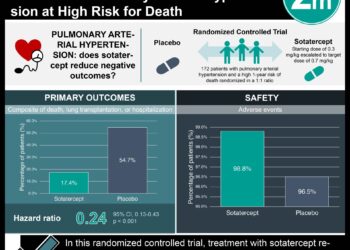Fixed-dose combination treatment with aspirin may reduce the risk of cardiovascular disease
1. Risk of cardiovascular death, myocardial infarction, stroke, and revascularization was lower in the fixed-dose combination pill group compared to control.
2. Fixed-dose combination strategies with aspirin resulted in greater reductions in mortality compared to without aspirin.
Evidence Rating Level: 1 (Excellent)
Study Rundown: Cardiovascular disease is among the leading causes of death worldwide. Primary prevention strategies are crucial for the management of cardiovascular disease burden. Existing research suggests that the use of fixed-dose combination treatments (or polypills), comprising of blood pressure lowering medications and a statin, may significantly reduce disease risk in individuals without a previous history of vascular disease. This meta-analysis aimed to determine the effectiveness of fixed-dose combination treatment strategies, with or without aspirin, for prevention of cardiovascular disease. The primary outcome for this study was the time to cardiovascular death, myocardial infarction, stroke, and arterial revascularization, while key secondary outcome included all-cause mortality. According to study results, fixed-dosed combination strategies, with or without aspirin, resulted in significant reductions in myocardial infarction, revascularization, stroke, and cardiovascular death, versus control. Additionally, among participants receiving fixed-dose combination pills, those who received aspirin demonstrated similar reductions in the primary outcome when compared to combination pills without aspirin. A limitation of this meta-analysis was that it included only three randomized controlled trials in the analysis.
Click to read the study in The Lancet
Relevant Reading: Comparative Effectiveness of Aspirin Dosing in Cardiovascular Disease
In-depth [meta-analysis]: This study consisted of three randomized controlled trials, each with ≥1000 participants and ≥2 years of follow-up, ultimately comprising of 18 162 patients. Among those enrolled, mean age was 63.0 years (standard deviation [SD] 7.1) and an equal proportion were male and female. The primary outcome of cardiovascular death, myocardial infarction (MI), stroke, and revascularization was lower among patients in the fixed-dose combination strategy group (n=276, 3.0%) compared to control (n=445, 4.9%; hazard ratio [HR] 0.62, 95% confidence interval [CI] 0.53-0.73, p<0.0001). The greatest reduction was observed for MI (HR 0.52, 95% CI 0.38-0.70), followed by revascularization (HR 0.54, 95% CI 0.36-0.80), stroke (HR 0.59, 95% CI 0.45-0.78), and cardiovascular death (HR 0.65, 95% CI 0.52-0.81). In addition, fixed-dose combination strategies with aspirin resulted in greater reduction in the primary outcome compared to without aspirin (HR 0.68, 95% CI 0.57-0.81, p<0.0001). Moreover, fewer complications were reported for fixed-dose combination treatment compared to control, including hemorrhagic stroke (0.2% vs 0.3%), fatal bleeding (<0.1% vs. 0.1%), and peptic ulcer disease (0.7% vs. 0.8%), although the differences were not significant. Findings from this study suggest that fixed-dose combination strategies significantly reduce the risk of cardiovascular disease and may be effective agents for primary prevention.
Image: PD
©2021 2 Minute Medicine, Inc. All rights reserved. No works may be reproduced without expressed written consent from 2 Minute Medicine, Inc. Inquire about licensing here. No article should be construed as medical advice and is not intended as such by the authors or by 2 Minute Medicine, Inc.






